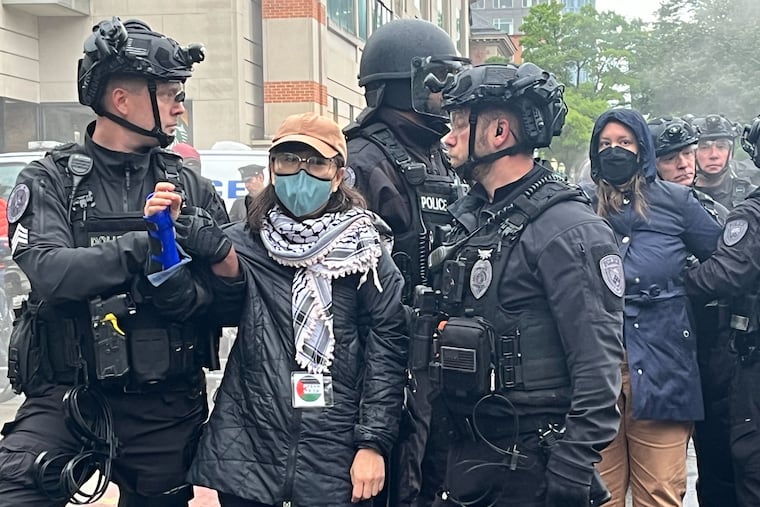Why we need a new encampment at Penn
We’d call it the Education Encampment. It's purpose? To discuss the Middle East conflict and the broader role of the United States in world affairs.

Penn sent in police Friday morning to dismantle its Gaza protest encampment. It got a thumbs-up yesterday from Gov. Josh Shapiro, who said that it was “past time” to “restore order and safety on campus” by removing the students who were living there.
But it was cops in riot gear — not unarmed, peaceful protesters — who overturned tents and pulled people out of them to get arrested. Remind me who was threatening order and safety again?
I understand why Penn wanted the encampment gone, especially as graduation season approaches. But I also think it was a mistake to forcibly remove it. For the past few weeks, I’ve been pleading for a different course: Build a new one.
We’d call it the Education Encampment. It would look a lot like the communities that protesters have set up on dozens of American campuses: tents, tarps, snack bars, juice boxes. People could stay overnight or just stop by, as they please.
But the purpose would be different: to teach, and to learn. We’d invite scholars, activists, and officials from every walk of life — and every political perspective — to discuss the Middle East conflict and the broader role of the United States in world affairs.
That’s what I thought universities were supposed to do: Explore and deliberate complex questions. But since the Oct. 7 Hamas attack in Israel — and the subsequent Israeli attack on Gaza — we have fallen down on the job. We have sacrificed education for public relations, and dialogue for damage control. Our goal has been to minimize injury — of every kind — instead of to maximize learning.
Let’s be clear: Some of the encampments have indeed triggered physical altercations, most prominently at UCLA. But to say that the protests were “disrupting campus operations” and “causing fear” — as Penn president Larry Jameson wrote last Monday — doesn’t jibe with what I witnessed, or with what my students reported.
I didn’t hear of anyone who was blocked from attending class or from going to their job because of the encampment. I know that some Jewish students, especially, viewed it as fundamentally antisemitic. But many other Jews eagerly joined the encampment, which didn’t generate the kind of harassment and intimidation that would justify suppressing it.
Besides, taking down the encampment won’t squelch the protesters. We might remove them from one space — or arrest them — but they’ll reappear at another one.
So it’s time to try a different tack, focused squarely on our fundamental purpose: education. To be fair, many universities — including Penn — have hosted speeches and lectures about the Mideast conflict. They have also sponsored events where people of different perspectives are encouraged to converse with each other.
But these well-meaning efforts haven’t drawn the kind of attention they deserve. At Washington University in St. Louis, for example, the school’s “Dialogue Across Difference” program staged a dozen “facilitated dialogue spaces” about the Gaza conflict last semester. A total of 17 people — yes, you read that right — showed up.
“Rallies get numbers, provocative measures get numbers,” one disappointed participant observed. “I don’t find that these cross dialogues get as many numbers because it’s a longer, more tedious process that is more frustrating.”
He’s right: Talking across our differences is hard, especially right now. But that’s why our universities need to do something big, creative, and dramatic in service of it.
We have sacrificed education for public relations, and dialogue for damage control.
And that’s where the Education Encampment comes in. Constructing a new tent community — and dedicating it to learning — would signal that the university was four-square behind that goal. It would also provide an instructive contrast to the “teach-ins” in the student encampments, which have reflected a singular perspective: Israel is a “settler-colonial” state, its attack on Gaza is a “genocide,” and so on. The protesters’ purpose isn’t to educate; it’s to persuade.
Universities have a different goal. We don’t seek to convert people to a particular point of view; we expose them to different ones, so they can decide what they think — about Israel, and everything else.
I know that there are many administrators, faculty, and students who believe deeply in that ideal, but they’re getting drowned out in the noise of the moment. So we need to do something loud and sensational to support them. We shouldn’t be suppressing the protest; we should be imitating it.
If a large university like Penn was bold enough to erect its own encampment, others might follow. To quote a frequent chant by the protesters, join us. And don’t forget your sleeping bag.